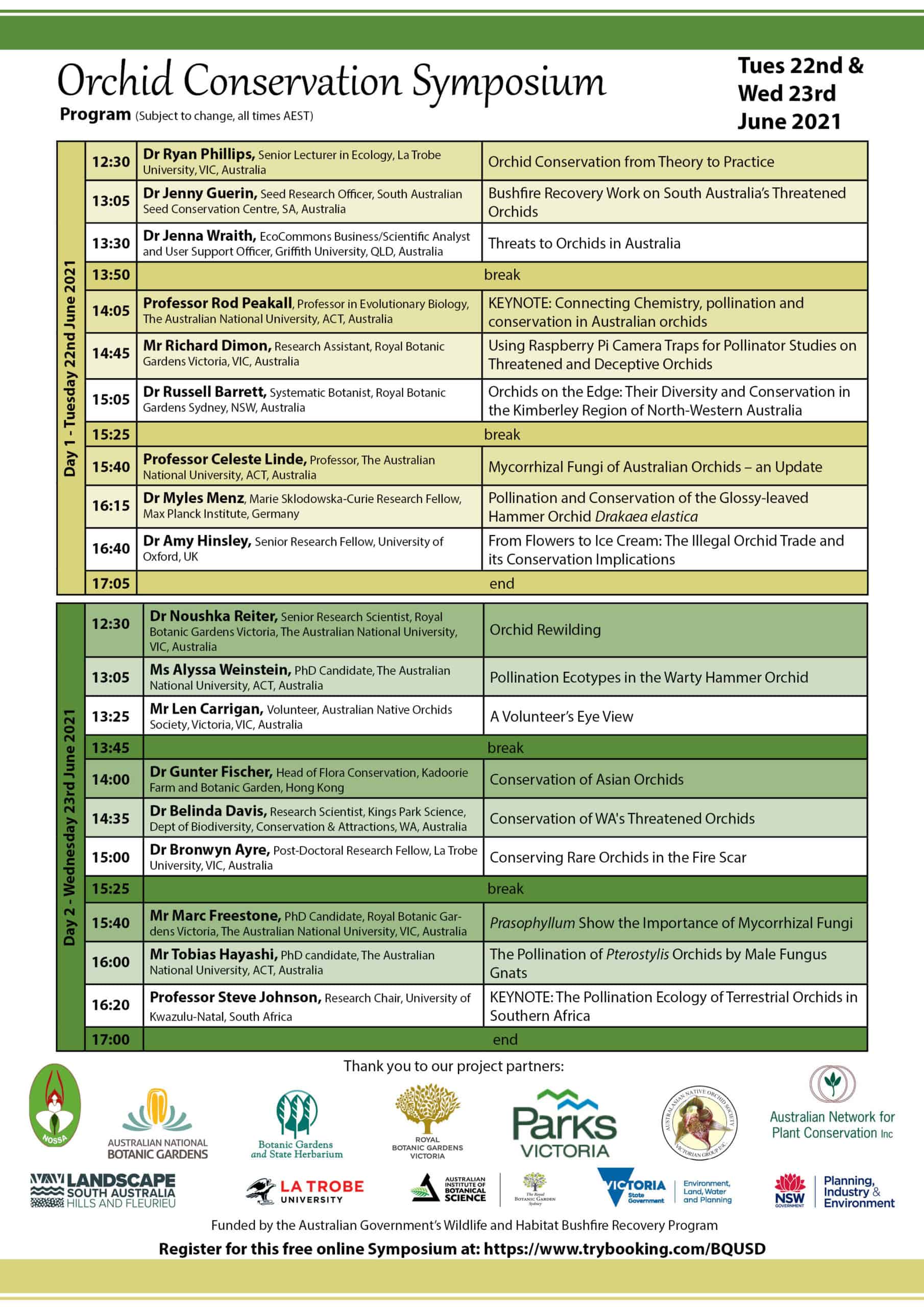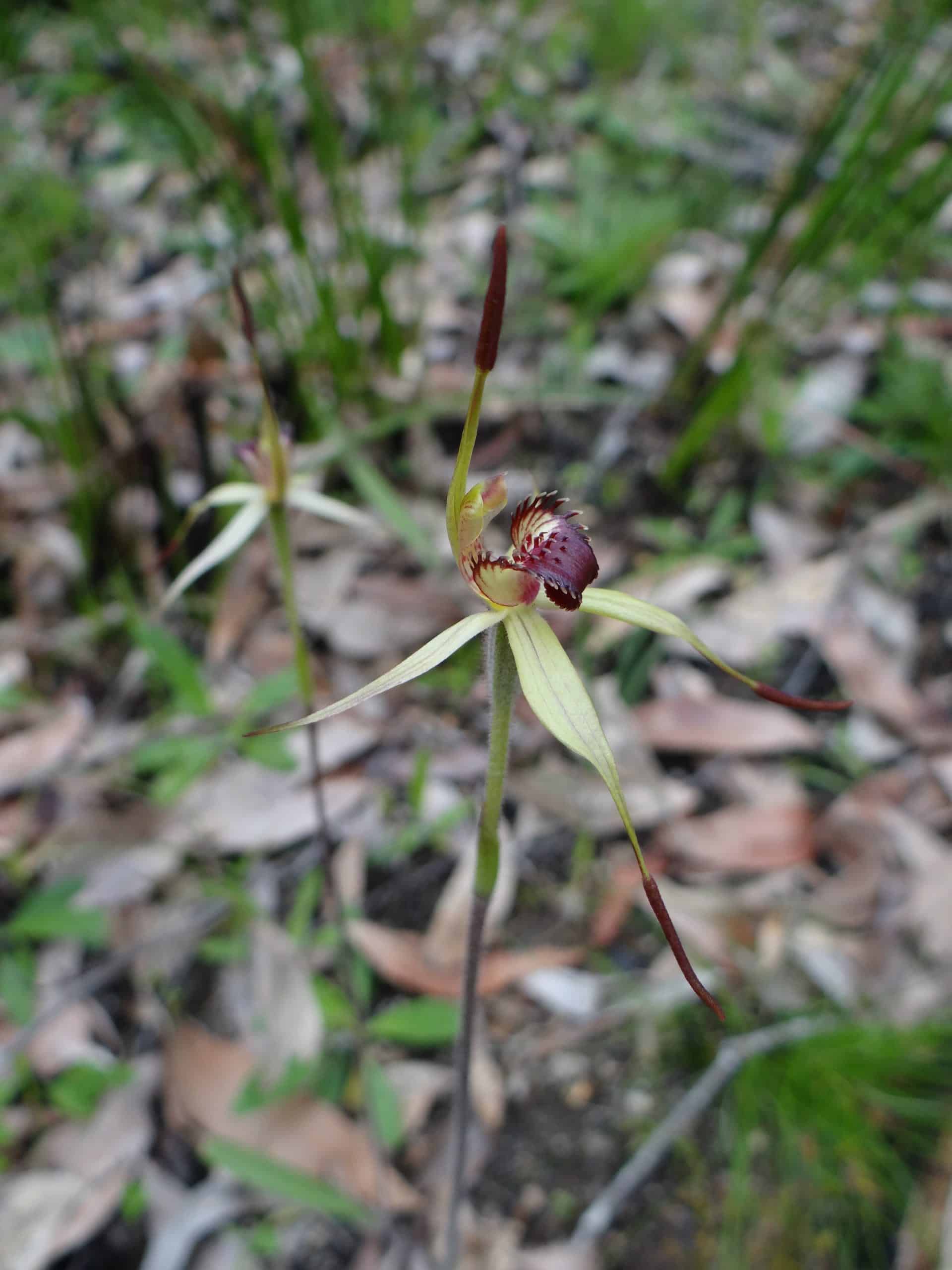The 2019-20 bushfires extensively affected orchid populations in the Australian Alps (NSW), East Gippsland (VIC) and at Kangaroo Island (SA). To prevent extinction of 14 nationally threatened orchid species in these areas, a project has been developed by Dr Noushka Reiter (Royal Botanic Gardens Victoria), Dr Ryan Philips (La Trobe University) and Dan Duval (Botanic Gardens of South Australia).
This project focusessed on understanding the response of orchid populations to fire, and identifying threats to orchid reproduction and survival. The project team undertook survival surveys, reproduction and herbivory studies, seed collection and propagation. For all 14 target species, ex situ (off site) permanent collections of living plants were established through symbiotic propagation using seed and mycorrhizal collections. Improved understanding of the ecology of these species will allow the team to propose management recommendations to conservation agencies, enhancing their chances of long-term survival in the wild.
To communicate the findings to a wide audience, the ANPC organised an orchid conservation symposium that was be held at the conclusion of the project.
Orchid Conservation Symposium
The ANPC held an Orchid Conservation Symposium with project partners on 22 and 23 June 2021. This symposium was held over two half-days and provided an online forum to increase awareness of the ecology and conservation of orchids amongst practitioners. It also provided an opportunity to share the project’s results and promote networking among the orchid conservation community.
To download the program, click here.
To view selected presentations, please visit the Orchid Conservation Symposium 2021 playlist on our YouTube channel.
Keynote speakers:
Professor Steve Johnson, Research Chair, University of Kwazulu-Natal, South Africa
Professor Rod Peakall, Professor in Evolutionary Biology, The Australian National University, ACT, Australia
Presenters:
| Ms Alyssa Weinstein, PhD candidate, The Australian National University, ACT, Australia |
| Dr Amy Hinsley, Senior Research Fellow, Oxford University, UK |
| Dr Belinda Davis, Research Scientist, Kings Park Science, Department of Biodiversity, Conservation and Attractions, WA, Australia |
| Dr Bronwyn Ayre, Post-Doctoral Research Fellow, La Trobe University, Vic, Australia |
| Professor Celeste Linde, Professor, The Australian National University, ACT, Australia |
| Dr Jenny Guerin, Seed Research Officer, South Australian Seed Conservation Centre, Botanic Gardens of South Australia, SA, Australia |
| Dr Gunter Fischer, Head of Flora Conservation, Kadoorie Farm and Botanic Garden, Hong Kong |
| Dr Jenna Wraith, EcoCommons Business/Scientific Analyst and User Support Officer, Griffith University, QLD, Australia |
| Mr Len Carrigan, Volunteer, Australian Native Orchids Society, (Vic Branch), Vic, Australia |
| Mr Marc Freestone, PhD Candidate, Royal Botanic Gardens Victoria, The Australian National University, ACT, Australia |
| Dr Myles Menz, Marie Sklodowska-Curie Research Fellow, Max Planck Institute, Germany |
| Dr Noushka Reiter, Senior Research Scientist, Royal Botanic Gardens Victoria, The Australian National University, ACT, Australia |
| Mr Richard Dimon, Research Assistant, Royal Botanic Gardens Victoria, Vic, Australia |
| Dr Russell Barrett, Systematic Botanist, Royal Botanic Gardens Sydney, NSW, Australia |
| Dr Ryan Phillips, Senior Lecturer in Ecology, La Trobe University, Vic, Australia |
| Mr Tobias Hayashi, PhD candidate, The Australian National University, ACT, Australia |
The orchids
Across three fire-affected regions, 14 orchid species were targeted, as they require urgent conservation attention. Four of the species are Critically Endangered (CR) under the Environment Protection and Biodiversity Conservation Act. The remaining eight species are listed as nationally threatened and had significant populations burnt in the recent fires.
The sphagnum bogs of the Australian Alps, NSW and VIC
Diuris ochroma
Prasophyllum bagonense (CR)
Prasophyllum frenchii
Prasophyllum innubum (CR)
Prasophyllum keltonii (CR)
Prasophyllum morganii
Pterostylis oreophila (CR)
The wet forests of east Gippsland, VIC
Caladenia aestiva
Caladenia ancylosa
Caladenia tesselata
Kangaroo Island and Mount Lofty Ranges, SA
Caladenia argocalla
Caladenia ovata
Pterostylis cucullata
Thelymitra matthewsii
*(CR) denotes Critically Endangered
Project activities
Several activities have been undertaken as part of this project including:
1. Plant survival surveys. Mapping fire affected populations will identify the number of surviving plants. This data can be compared with past population estimates to understand the impact of recent fires on orchid populations.
2. Collecting reproduction and herbivory data. Pollinator exclusion experiments will be undertaken to understand which orchid species rely on pollinators for reproduction. Pollination rates will be quantified to determine if pollinators are limiting reproduction in post-fire landscapes. Camera traps will be used to identify what animals are eating orchids and quantify herbivory rates.
3. Seed collection. Seed will be collected at the end of the flowering season for each of the 14 orchid species. This seed will be used for propagation and also stored in seedbanks at the Royal Botanic Gardens Victoria and the Botanic Gardens of South Australia with duplicates where available stored at the Australian National Botanic Garden and the Royal Botanic Gardens Sydney.
4. Mycorrhizal collection. Mycorrhizal fungi will be collected from populations of each of the 14 species and used for propagation with representative samples stored permanently at the Royal Botanic Gardens Victoria and the Botanic Gardens of South Australia.
5. Propagation. For all 14 species symbiotic propagation from seed will be conducted to produce ex situ (off site) collections of 200 adult plants per species. The collections will be maintained at two of the partner botanic gardens.
Collaborators
This project is made possible by the commitment of our partner organisations:
La Trobe University
The Royal Botanic Gardens Victoria (RBGV)
The Botanic Gardens of South Australia (BGSA)
The Australian National Botanic Gardens
The Royal Botanic Gardens Sydney
The Australasian Native Orchid Society (ANOS Vic Branch)
The Native Orchid Society of South Australia (NOSSA)
The Department of Environment, Land, Water and Planning (DEWLP – Victoria)
Parks Victoria
The Department of Planning, Industry and Environment (DPIE – NSW)
Hills and Fleurieu Landscape Board (formerly Natural Resources Adelaide and Mount Lofty Ranges)
Funding
Funding for this project was provided by the Australian Government’s Wildlife and Habitat Bushfire Recovery Program.



